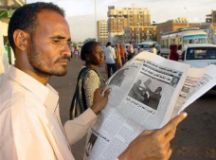Sudanese journalists hopeful of freedom of expression
By TANALEE SMITH
KHARTOUM, Sudan, July 11, 2005 (AP) — Sudanese newspapers proclaimed a new era of freedom of expression on Monday, saying they had been promised press restrictions would stop now that the African country’s state of emergency has been lifted.

|
|
A Sudanese man reads a daily newspaper in Khartoum Monday July 11, 2005. (AP). |
“Lifting censorship from newspapers,” read a large red headline that ran above the Al-Ayam newspaper’s masthead. “Freedom of movement, association and press guaranteed from today onwards,” The Juba Post promised in its first edition since being shut down three weeks ago for allegedly not properly registering.
The weekend’s signing of a new constitution paved the way for President Omar el-Bashir to end restrictive state of emergency laws in place for most of the years since he took power in a 1989 coup. A prime target of the laws were the country’s newspapers, particularly those critical of the government.
But some wary journalists _ long accustomed to officials vetting stories and closing newspapers _ aren’t celebrating yet, and are instead hoping the restrictions and harassment of the recent past will not return sometime soon.
Sudan has a history of suspending newspapers and detaining journalists and el-Bashir’s promises to end censorship have never been enacted. As recently as Saturday, security officers inspected reports at Al Sahafa, a leading Arabic newspaper, and banned several articles and a column from being printed, columnist Zuheir Mohamed Ali Abdel-Meguid said.
Security men would come to the paper nightly between 10 p.m. and midnight to make their checks on what stories were going to run in the next day’s editions, Abdel-Meguid said.
Providing a freer Sudanese press has been a persistent demand by international media watchdogs and the United States, which has welcomed the new constitution but tied its normalizing of relations with Khartoum to a set of issues _ including the treatment of journalists.
After el-Bashir decreed the end of the emergency laws across most of Sudan, the National Security Organ issued a statement affirming its commitment to upholding el-Bashir’s orders. The media “should play their national role without the need of putting any restrictions on them,” the security agency said.
In the first Sudanese news report on government press restrictions, Al-Ayam ran a small front-page commentary Monday saying security authorities used to come to its offices “lifting news items, essays and columns that do not fall in line with the view of the security organ.”
“It is a new era,” Abdel-Meguid said. “But anything can happen. I think they will enter a period of hibernation but come back.”
The media’s new promise follows other historic changes in Sudan.
On Saturday, southern Christian and former rebel leader John Garang was sworn in as first vice president in a new government of national unity. The constitution he and el-Bashir signed laid out freedoms of religion and expression as human rights. It also guaranteed freedom of publication and the press “without prejudice … as regulated by law.”
Though the wording could allow for a monitoring body to interpret what the “law” may allow, it is more open than the previous constitution. That had said press freedom was “subject to restrictions necessary to security, public order, public safety, public morals.”
Ali Shummo, head of the regulatory Sudan Press Council that issues newspaper licenses and monitors newspapers, said dailies “are free to publish anything, provided they do not spread hatred or incite religious or ethnic intolerance.”
The council can still suspend newspapers for up to seven days, but disputes must be resolved in court.
One case already in court involves the Khartoum Monitor, an English-language newspaper focussing on southern issues that has been repeatedly closed. Its license was suspended in early June so the court could review a 2003 case finding it guilty of crimes against the state for publishing a story about slavery in southern Sudan. The newspaper successfully appealed the decision but is in court again.
“The new Sudan is the old Sudan,” managing editor William Ezekiel said. “They lifted the state of emergency, but where are we now?”
But Ezekiel said fellow southerner Garang’s appointment has given him a “glimpse of hope” because “he has been fighting for the cause of freedoms.”
A newspaper to have already benefited from the changes is The Juba Post, which printed its weekly edition Sunday after being closed July 23. Three of its journalists were also temporarily detained.
Correspondent Joseph Aligo Kenyi said the southern Sudan-based paper had been unfairly closed even though the National Press Council had issued it a license. But its Sunday edition went ahead because of Garang’s appointment and its newsworthiness to the south. Kenyi remained unsure if next week’s issue would come out.
“We need a free press,” said Kenyi. “We don’t need people to tell us what to print.”
However, press council head Shummo said a written apology by the Post had resolved the conflict and it would receive its license soon.
Al-Fateh Al-Sayed, secretary-general of the Sudanese Journalists Union, said ending censorship restrictions comes at a time when Sudan needs a free and responsible press.
“This will help in cementing the peace agreement and play a role in informing the public and pointing out the shortcomings of the government,” he said.
